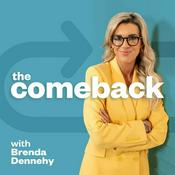14 episodes

Hidden Brain: Theory Vs. Reality: Why Our Economic Behavior Isn't Always Rational
29/4/2025 | 50 mins.
From Hidden Brain:We don't always behave the way economic models say we will. We don't save enough for retirement. We order dessert when we're supposed to be dieting. We give donations when we could keep our money for ourselves. Again and again, we fail to act rationally and selfishly — the way traditional economics expects us to. We've seen this during the coronavirus crisis: People selflessly mobilizing to help each other, like the retired Kansas farmer who sent an N95 mask to New York to help a nurse or a doctor. At the same time, though, we've also seen some people do exactly what economic theory assumes they will: Place their own self-interest above everything else. There are those who have even tried to profit from the pandemic, like the man in New York accused of stockpiling N95 masks to sell at an inflated price. Think about this man who hoarded masks and the man who donated a mask. In almost every sphere, our public and economic policies are designed around the assumption that most of us are going to behave like the first man. Legislators pass laws that take aim at transgressors. Regulators and police departments come up with rules that punish lawbreakers. Parents and teachers discipline truants.

Econtalk: Robert Frank on Inequality
22/4/2025 | 1h 1 mins.
From Econtalk:Robert Frank of Cornell University talks with EconTalk host Russ Roberts about inequality. Is there a role for public policy in mitigating income inequality? Is such intervention justified or effective? The conversation delves into both the philosophical and empirical evidence behind differing answers to these questions. Ultimately, Frank argues for a steeply rising tax rate on consumption that would reduce disparities in consumption. This is a lively back-and-forth about a very timely topic.

Throughline: Lives Of The Great Depression
15/4/2025 | 47 mins.
From Throughline:The Great Depression was a revolutionary spark for all kinds of things — health insurance, social safety nets, big government — all of which were in response to a national crisis. Through the personal accounts of four people who lived during the Great Depression, we look back at what life was like back then and what those stories can teach us about the last time the U.S. went through a national economic cataclysm.

Vox Talks: Climate shock: the economic consequences of a hotter planet
08/4/2025 | 9 mins.
From Vox Talks:At the heart of policy debates about our collective responses to climate change is the issue of risk and uncertainty - ‘unknown unknowns’ about the impact of global warming. In this Vox Talk, Gernot Wagner - co-author with Harvard’s Martin L. Weitzman of 'Climate Shock: The Economic Consequences of a Hotter Planet’ - argues for Pigovian taxes and carbon pricing, against geoengineering solutions, and why 'we need to stick it to CO2, not to capitalism’.

Planet Money: Quit Threat
01/4/2025 | 22 mins.
From Planet Money:On today's show, we ask: What does full employment really look like? NPR sent reporters across the country, including to Ames, Iowa, the city with the lowest unemployment rate, to find out. The unemployment rate is just 3.6% in the U.S., a 50-year low. People think we are at, or near, full employment. That's the lowest the unemployment rate can go without triggering inflation. And when the labor market is that tight, power shifts from employers to workers. When unemployment is low, workers can threaten to quit and their bosses have to take that threat seriously. That's what leads to raises.
More Education podcasts
Trending Education podcasts
About Oxford College Principles of Microeconomics Course
Listen to Oxford College Principles of Microeconomics Course, The Mel Robbins Podcast and many other podcasts from around the world with the radio.net app

Get the free radio.net app
- Stations and podcasts to bookmark
- Stream via Wi-Fi or Bluetooth
- Supports Carplay & Android Auto
- Many other app features
Get the free radio.net app
- Stations and podcasts to bookmark
- Stream via Wi-Fi or Bluetooth
- Supports Carplay & Android Auto
- Many other app features


Oxford College Principles of Microeconomics Course
download the app,
start listening.



































